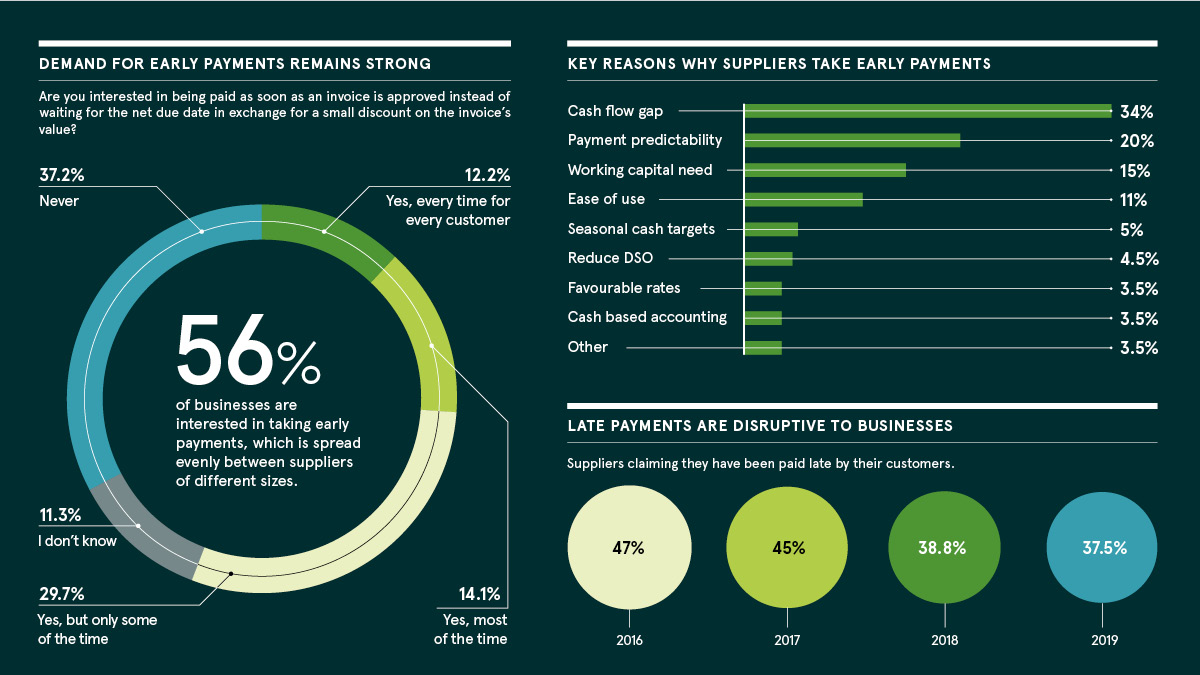SPONSORED BY Taulia
Mainstream players in the banking sector have woken up to the rapid technology advancements made by agile fintech providers in supply chain finance and are eager to partner on solutions that enable companies to free up their liquidity.
Legacy banks face huge challenges in transforming their own operations to deliver new and more innovative financing options to businesses, such as early payments. Manual processes are still prevalent in major banks and in the area of early payments specifically; some even require buyers to add resource to help manage programmes.
Supply chain resilience and cash-flow management are an increasingly pressing concern for businesses. According to a recent announcement by Taulia, early payment volume was up 208 per cent month-over-month in March 2020. New supplier adoption was up 178 per cent during the same period and 56 per cent of small businesses said they want to be paid early. A J.P. Morgan survey last year said small and medium-sized enterprises (SMEs) only have 27 days of cash reserves to survive any disruption.

Treatment of particularly smaller suppliers when it comes to payments is a major issue. According to Taulia’s survey, 37.5 per cent of businesses are paid late on average. This problem, of course, is exacerbated during times of uncertainty. Supplier demand for early payment goes up, liquidity shrinks as banks tighten credit availability and companies become more reluctant to deploy their own cash.
“Early payment is a crucial tool for bridging cash flow gaps,” says David Venables, head of UK and Ireland sales at Taulia. “It’s a simple mechanism which, if structured and deployed correctly, can offer very flexible access to finance for SMEs at very competitive rates.
“Instead of being tied into the contractual payment terms that are put in place when they first begin selling to large customers, suppliers have complete flexibility to decide when and how they get paid, almost on a daily basis. It’s handing control to suppliers to determine when they get paid to suit the needs of their business at any particular time.”
“Suppliers have complete flexibility to decide when and how they get paid, almost on a daily basis”
There is a strong link between payment certainty and supply chain resilience. If suppliers have greater visibility and control over their cash flow and a mechanism to improve their own working capital metrics, then they can become stronger and more viable businesses. The risk of supply chain disruption is thereby reduced.
“If you talk to any chief procurement officer or any senior treasury official in a large corporate, they want to know their supply chain is robust, particularly when you start talking about companies in sectors such as automotive or aerospace,” says Venables. “The absence of the very smallest component from the very smallest supplier might mean that an entire car or aircraft production line comes to a halt.
“The concept of de-risking your supply chain as much as possible and making sure your suppliers are in as robust financial health as possible is critically important. Allowing suppliers to take payment early is of course giving them the potential to take a huge working capital benefit. As well as bringing greater certainty to their existing manufacturing capabilities and operations, it gives them working capital to improve their manufacturing capabilities and the underlying products they supply.”
Taulia is a leading provider of working capital solutions, helping companies liberate cash across the supply chain. Through a unique combination of its artificial intelligence-powered platform, people and process, the company helps companies access the value tied up in their supply chain by transitioning from inefficient and often manual working capital management practices into technology-led.
If programmes are structured correctly and priced fairly, respecting best practice in relevant markets such as the prompt payment code in the UK, then early payment programmes can be a tremendous force for good. Central to Taulia’s ethos is a commitment to allow companies large and small to choose when and how they get paid.
Supporting the largest early payment programmes in the world, Taulia has provided much-needed robustness to companies during the coronavirus pandemic, which has demanded an even greater flexibility for smaller suppliers. Its technology also enables large corporates to improve and automate processes such as invoicing, which as well as driving cost savings can enhance the working capital benefits of the programme.

Companies can use Taulia’s platform to calculate a selection of future invoices which they can take for early payment to meet a future obligation. If, for example, they’re required to make a large tax payment in 45 days, they can put those details into the platform and the technology will suggest which invoices to take early payment on to meet that obligation.
Connecting at a deep level with enterprise resource planning (ERP) systems means Taulia can rely on the data and client information that buyers have built up and automate the exchange of information to a far greater degree than when using a traditional file exchange-type arrangement.
“It means the ongoing programme management and visibility of performance for any large buyer corporate is far improved,” says Venables. “They can manage the programme within their own ERP system, which is an IT environment they’re already familiar with. We can deliver reporting and data back to them to a level of detail that most other providers cannot provide, and also in a format that’s easily understood for them and allows them to manage the programme at a granular level on a day-to-day basis.
“I think we will continue to see growing demand for supply chain finance across the globe, with companies increasingly looking for providers that can offer access to large swathes of their supply chain and technology, which delivers process efficiency and high data quality and reporting. I also believe that the pool of liquidity available to support supply chain finance programmes globally will grow beyond traditional bank sources to include other complementary providers, such as asset managers and pension funds.”
For more information please visit taulia.com
